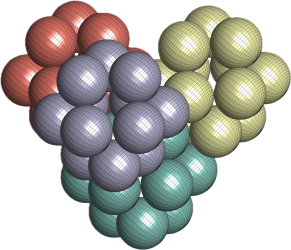I started with plane group packings of heptagons. The heptagons are not precisely regular as I used a simple construction method. That is I placed points on a unit circle with the angle difference of 2*pi/7.
For every space group 100 experiments were performed with random initial configurations. The way the algorithm works now is that it doesn’t need feasible initial configuration.
The best know packing of heptagons is 0.892690686126509 which is also believed to be optimal. Same double lattice packing as withe pentagons. https://blogs.ams.org/visualinsight/2014/11/15/packing-regular-heptagons/
Plane group: p2
Max density: 0.892607642589804
Mean density: 0.8425
Density variance: 0.0015
Number of infeasible solutions: 0
0.4777
0.2507
0.8900
1.9010
3.7421
1.0389
Plane group: cm
Max density: 0.8414
Mean density: 0.7251
Density variance: 0.0033
Number of infeasible solutions: 0
Plane group: p2mm
Max density: 0.7365
Mean density: 0.5760
Density variance: 0.0125
Number of infeasible solutions: 0
Plane group: p2mg
Max density: 0.8238
Mean density: 0.6826
Density variance: 0.0097
Number of infeasible solutions: 0
Plane group: p2gg
Max density: 0.892690618215488
Mean density: 0.8643
Density variance: 6.5725e-04
Number of infeasible solutions: 0
Plane group: c2mm
Max density: 0.7390
Mean density: 0.5719
Density variance: 0.0040
Number of infeasible solutions: 0
Plane group: p3m1
Max density: 0.5718
Mean density: 0.5377
Density variance: 0.0022
Number of infeasible solutions: 0
0.3232
0.3333
4.4878
5.7579







